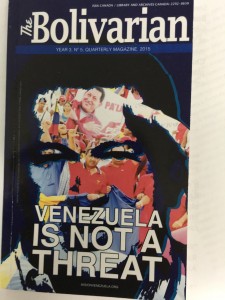Source: The Bolivarian, Year 3, No. 5, Quarterly Magazine, 2015, Canada. Published by the Embajada de la República Bolivariana de Venezuela en Canadá.
by Arnold August
Under sharp questioning by reporters at a daily press briefing on March 10, 2015 – one day after Barack Obama’s Executive Order against Venezuela – U.S. Department of State spokesperson Jen Psaki declared, “The goal of these sanctions is to persuade the Government of Venezuela to change their behavior.”1 Is the only concern the Government of Venezuela’s behavior? Since December 1998, when Commander Hugo Chávez won the presidential elections, and now under the leadership of President Nicolás Maduro, the main characteristic of this behavior has been to develop new experiments in participatory democracy. This means the political power of the people exercised in daily concrete actions and political thinking. The fresh projects of participatory democracy displace representative democracy, whose main feature is to restrain people at the base so that they rely on elected representatives. Participatory democracy has been progressively resulting in the fusion of elected representatives at all levels, including government leaders, into the daily political, social and economic life of the people. It is now increasingly difficult to distinguish leadership from the grass roots. Thus, the primary concern of the Obama administration is that the Bolivarian Revolution is a real revolution in which the main protagonists are the people themselves. Concentrating on the behavior of the Government of Venezuela is, in fact, just a smokescreen to cover up the fact that the revolution being developed is not from the top down. This revolution has succeeded where others have failed, that is, it promotes a dialectical relationship between the top down and the bottom up. The Bolivarian Revolution represents a revolution in political culture: its main feature is that people are their own liberators, and this can only be realized if exercised on a daily basis; there is no easy way out. The Venezuelan people are increasingly aware of this. This is Obama’s real concern with regard to the conduct of the government: the U.S. is not facing merely a government, but a revolution that becomes stronger and more mature as it defends itself. This is not to say that setbacks cannot and will not take place. This is bound to happen as Venezuela is evolving in a very complicated situation whereby the U.S. government and the international media are targeting Venezuela. However, the Bolivarian Revolution has become a material force that can be detected, as I have noticed during my visits to Caracas. I am convinced that it cannot be destroyed.
Its vibrancy, as exhibited now in the heat of the battle, serves as an example to other countries, especially in Latin America and the Caribbean. In this region, the most dynamic in the world today, alternative media such as Telesur and the use of social media allow the people in the area to follow events and reach their own conclusions for their respective countries. Therefore, one cannot underestimate the potential positive impact of the Venezuelan experiment on other countries. This is the first of Obama’s real concerns regarding Venezuelan behavior, thus the attempt to drive a wedge between the government and the people.
What is the second concern? In 2011, Obama stated that “even if we tap every single reserve available to us, we can’t escape the fact that we only control 2 percent of the world’s oil, but we consume over a quarter of the world’s oil.”2 Today, Venezuela has the biggest certified oil reserves in the world. The problem is that the U.S. cannot at this time extend its control of its own relatively limited domestic reserves to those of Venezuela. This second real concern is intimately related to the first one, the new political culture of people’s power. Right from the initial mandate of Hugo Chávez, for the first time in the history of that country, the benefits of petroleum have been used for vastly improving all facets of Venezuelan life: economic, social, health, education, culture and sports. The concern of Obama is that the people at the base are generally aware of this, because they are involved in working out and applying the deviation of this source of income to their own benefit. The grass roots are very conscious of the source of the improvements to their daily life and see themselves as partners along with the leadership in executing the new programs. Thus both of Obama’s concerns are intimately linked.
1 Jen Psaki, U.S. Department of State Spokesperson, Daily Press Briefing, Washington, DC, March 10, 2015, http://www.state.gov/r/pa/prs/dpb/2015/03/238718.htm.
2 Barack Obama, The White House, Office of the Press Secretary, March 11, 2011, News Conference by the President, https://www.whitehouse.gov/the-press-office/2011/03/11/news-conference-president.

